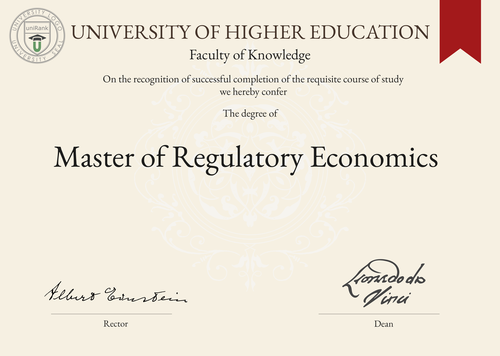
Master of Regulatory Economics (MRE)
Guide to Master of Regulatory Economics Program/Course/Degree
Master of Regulatory Economics (MRE)

Program Name
Master of Regulatory EconomicsProgram or Degree abbreviation
MREDuration range
1-2 yearsTuition range
Varies by country and universityOverview
The Master of Regulatory Economics program is designed to provide students with a comprehensive understanding of the principles and practices of regulatory economics. This program equips students with the necessary skills and knowledge to analyze and evaluate regulatory policies and their impact on various industries and markets.Curriculum Overview by year
Year 1: - Microeconomics for Regulatory Analysis - Macroeconomics for Regulatory Analysis - Quantitative Methods for Regulatory Economics - Regulatory Policy and Governance - Regulatory Impact Assessment Year 2: - Advanced Topics in Regulatory Economics - Competition Policy and Regulation - Energy Regulation - Telecommunications Regulation - Financial RegulationKey Components
- Economic theory and principles - Regulatory policy and governance - Quantitative analysis and research methods - Industry-specific regulations - Competition policy and regulationCareer Prospects
Graduates of the Master of Regulatory Economics program can pursue various career paths in both the public and private sectors. They can work as regulatory economists, policy analysts, consultants, or researchers in government agencies, regulatory bodies, international organizations, or private companies.Salary Expectations
Salaries for professionals with a Master of Regulatory Economics degree can vary depending on factors such as location, industry and experience. On average, regulatory economists can earn a competitive salary ranging from $60,000 to $100,000 per year. For a more accurate understanding of salary expectations, you can utilize the Job Sites Search Engine, from our sister site jobRank, which searches over 4,600 job sites worldwide. Make sure to specify not only the job title but also the country you are interested in.Conclusions:
It is important to note that the duration, tuition fees, curriculum, key components, career prospects and salary expectations of the Master of Regulatory Economics program can vary depending on the country or location where you choose to study, as well as the university you select. To find specific information about where this degree is offered worldwide, visitors can utilize the uniRank World Universities Search Engine. This tool allows you to search for universities offering the Master of Regulatory Economics program in various countries, helping you make an informed decision about your educational journey.World Universities Search Engine
search for Master of Regulatory Economics (MRE) and add the Location (country, state etc.) or specific University you are interested in studying at.
Query examples:
- Master of Regulatory Economics (MRE) United States
- Master of Regulatory Economics (MRE) United Kingdom online
- Master of Regulatory Economics (MRE) Australia international students
- Master of Regulatory Economics (MRE) University of California
- Master of Regulatory Economics (MRE) University of London tuition fees
- Master of Regulatory Economics (MRE) University of Sydney scholarships
Share Program/Course
Interesting? Share this program/course/degree info with your friends now.